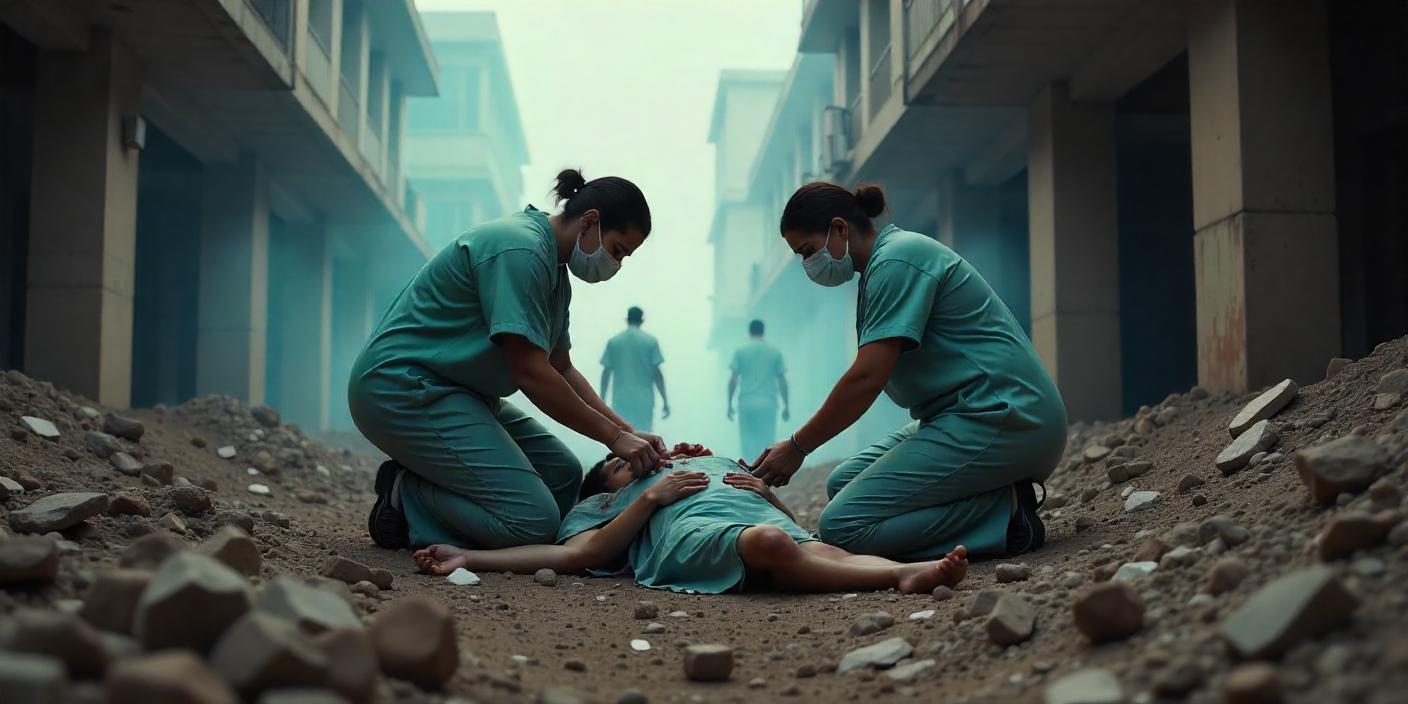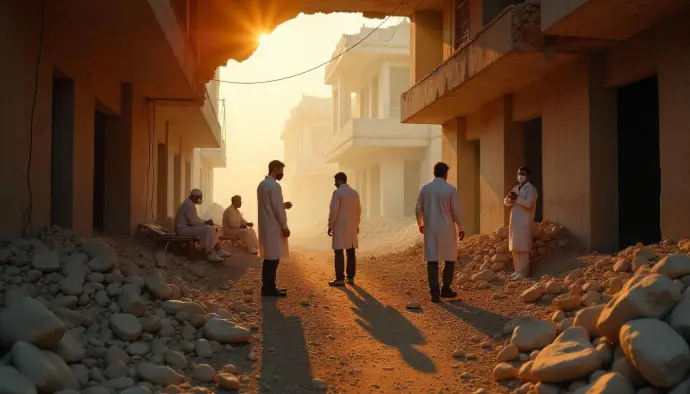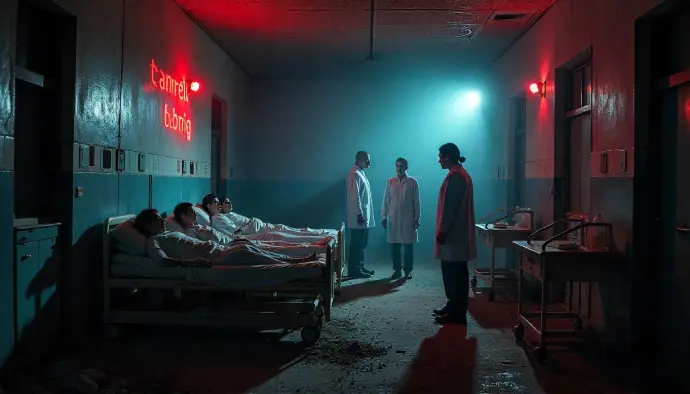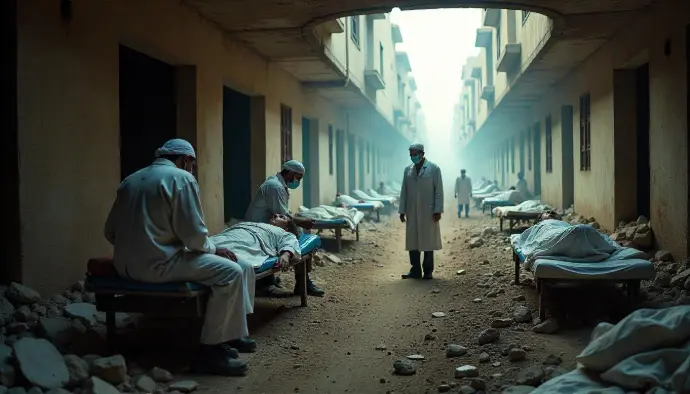
Medical Treatment in Conflict Zones: Are Health Rights Respected?
Here you will find a space dedicated to an in-depth exploration of human rights at the global level. In our main article, "Medical Treatment in Conflict Zones: Are Health Rights Respected?", we will comprehensively analyze respect for health rights in conflict zones. Have you wondered how access to medical care is guaranteed in crisis situations? We invite you to delve into this fascinating topic and discover more about the challenges faced by human rights defenders in armed conflict.
Introduction
Armed conflict has a devastating impact on human rights, particularly regarding access to healthcare. Conflict zones often experience severe shortages of medical resources, endangering the lives of the affected population. Furthermore, healthcare infrastructure, such as hospitals and clinics, are frequently targeted, making access to healthcare even more difficult. This precarious situation has disastrous effects, especially for the most vulnerable groups, such as women, children, and the elderly, who rely heavily on healthcare services.
Violence and insecurity in conflict zones also hamper healthcare workers' access to affected communities, limiting their ability to provide timely and adequate healthcare. Furthermore, the lack of medical supplies and the disruption of health services due to conflict contribute to an increase in preventable diseases and higher mortality, further exacerbating the humanitarian crisis in these areas.
In this context, it is essential to comprehensively analyze how the right to health is being respected in conflict zones, in order to raise awareness about this issue and promote actions that guarantee access to medical care in crisis situations.
Access to health in conflict zones is of vital importance, as the preservation of the life and well-being of the affected population depends largely on the availability of adequate medical services. Lack of access to health care can have devastating consequences, including increased morbidity and mortality, especially among vulnerable groups.
Furthermore, access to health in conflict zones refers not only to the availability of medical services, but also to the protection of health workers and medical facilities from attacks and acts of violence. Ensuring a safe environment for the provision of health services is essential to ensure that affected communities receive the necessary care in times of crisis.
Respect for health rights in conflict zones is a key indicator of the humanitarian situation in these areas, and a detailed analysis identifies challenges and opportunities to improve the situation and protect the fundamental rights of the affected population.
Background on respect for health rights in conflict zones has revealed numerous challenges and significant violations. The lack of protection for health workers, the destruction of medical infrastructure, and deliberate attacks on health facilities have been recurrent in several armed conflicts, severely impacting access to health care for the affected population.
International organizations, such as the World Health Organization (WHO) and the International Committee of the Red Cross (ICRC), have documented numerous cases of health rights violations in conflict zones, raising greater awareness of the importance of protecting these fundamental rights in crisis situations. However, despite the efforts made, significant challenges persist in protecting and ensuring access to health in settings affected by armed conflict.
A detailed analysis of the background on respect for the right to health in conflict zones is essential to understanding the magnitude of the problem and to promoting concrete actions that promote respect for and protection of these fundamental rights in situations of humanitarian crisis.
The current challenges in the protection of health rights in conflict zones are numerous and complex. First, violence and insecurity hinder the population's access to basic medical services. Health centers and hospitals are frequently targeted, endangering the lives of patients and health workers.
This situation creates an environment of fear and mistrust that hinders the provision of health care services. Furthermore, a lack of resources, a shortage of trained medical personnel, and disruptions to medical supplies due to the conflict contribute to the precariousness of health care in these areas.
The disorganization of health systems and the destruction of infrastructure also hinder the provision of effective health services. As a result, people living in conflict zones face a greater risk of illness, injury, and premature death due to lack of access to adequate health care. Furthermore, discrimination and gender-based violence also affect women and girls' ability to access reproductive health and prenatal care services, further exacerbating the situation. These challenges require comprehensive and coordinated responses at the local, national, and international levels to ensure respect and protection of health rights in conflict zones.
Background on respect for health rights in conflict zones
Background on respect for health rights in conflict zones has revealed numerous challenges and significant violations. The lack of protection for health workers, the destruction of medical infrastructure, and deliberate attacks on health facilities have been recurrent in several armed conflicts, severely impacting access to health care for the affected population.
International organizations, such as the World Health Organization (WHO) and the International Committee of the Red Cross (ICRC), have documented numerous cases of health rights violations in conflict zones, raising greater awareness about the importance of protecting these fundamental rights in crisis situations. However, despite the efforts made, significant challenges persist in protecting and ensuring access to health in settings affected by armed conflict.
A detailed analysis of the background on respect for the right to health in conflict zones is essential to understanding the magnitude of the problem and to promoting concrete actions that foster respect for and protection of these fundamental rights in humanitarian crisis situations.
The current challenges in the protection of health rights in conflict zones are numerous and complex. First, violence and insecurity hinder the population's access to basic medical services. Health centers and hospitals are frequently targeted, endangering the lives of patients and health workers.
This situation creates an environment of fear and mistrust that hinders the provision of health care services. Furthermore, a lack of resources, a shortage of trained medical personnel, and disruptions to medical supplies due to the conflict contribute to the precariousness of health care in these areas.
The disorganization of health systems and the destruction of infrastructure also hinder the provision of effective health services. As a result, people living in conflict zones face a greater risk of illness, injury, and premature death due to lack of access to adequate health care. On the other hand, discrimination and gender-based violence also affect women and girls' ability to access reproductive health and prenatal care services, further exacerbating the situation. These challenges require comprehensive and coordinated responses at the local, national, and international levels to ensure respect for and protection of health rights in conflict zones.
Analysis of the Current Situation
In conflict zones, the availability of medical services is a crucial concern. Assessing the availability of medical care in these areas is critical to understanding the magnitude of the humanitarian crisis. Lack of access to basic medical services can have devastating consequences for the affected population, exacerbating suffering and endangering the lives of thousands of people.
Assessing the availability of medical services in conflict zones involves analyzing various factors, such as the presence of medical facilities, the availability of trained personnel, access to medicines and supplies, and emergency response capacity. This comprehensive assessment is essential to identifying critical needs and coordinating humanitarian assistance effectively.
It is essential that international organizations, NGOs, and governments work together to conduct accurate assessments and develop strategies to ensure equitable access to medical care in these crisis situations.
Violence in conflict zones has a direct impact on access to health care. Attacks on medical facilities, the forced displacement of health professionals, and the destruction of health infrastructure are significant obstacles that hinder the population's access to essential medical services.
Furthermore, widespread violence can create a climate of fear and mistrust that discourages people from seeking medical care, even when they urgently need it. This situation further exacerbates the humanitarian crisis and puts the lives of those affected by the conflict at risk.
It is essential to respect the right to health care, protecting health professionals and medical facilities, and ensuring a safe environment so that people can seek medical help without fear of reprisals. Respect for these ethical principles is essential to preserving the dignity and well-being of populations affected by armed conflict.
In situations of armed conflict, respect for ethical principles in the provision of medical care is fundamental. Health professionals must be able to provide impartial care to all people, regardless of their political, religious, or ethnic affiliation. It is also crucial that medical confidentiality and patient privacy be respected, even in environments of high tension and violence.
Respect for these ethical principles not only benefits patients but also contributes to building trust and social cohesion in affected communities. When impartiality and neutrality are ensured in the provision of health care, it lays the foundation for long-term reconciliation and stability.
Humanitarian organizations, governments, and forces in conflict have a responsibility to respect and protect access to health care, ensuring that fundamental ethical principles are upheld in all circumstances. This is essential to mitigating the devastating impact of armed conflict on the health and well-being of affected populations.
In conflict zones, the full exercise of the right to health faces numerous obstacles that hinder access to adequate medical care. Among the main factors that hinder this right are the lack of medical infrastructure, shortages of supplies and medicines, insecurity that hinders the movement of medical personnel and patients, and lack of access to basic medical services.
The lack of medical infrastructure in conflict zones is a determining factor that hinders the full exercise of the right to health. Hospitals and health centers are frequently targeted, reducing medical care capacity and endangering the lives of patients and medical personnel. Furthermore, shortages of supplies and medicines are a constant challenge, limiting the ability of health professionals to provide necessary care.
Insecurity in conflict zones also hinders the full exercise of the right to health, as it hinders the safe movement of medical personnel and patients. This limits access to medical care, especially for those in urgent need of treatment. Furthermore, the lack of access to basic medical services, such as vaccinations and prenatal care, contributes to the precarious health situation in these areas, disproportionately affecting women and children.
Examining Health Rights Violations
In conflict zones, identifying specific health rights violations is crucial to understanding the magnitude of the problem. Health rights violations can manifest themselves in a variety of ways, including lack of access to health care, disruption of health services, attacks on medical facilities, and denial of humanitarian assistance. These violations not only affect individuals but also have a devastating impact on communities and the resilience of conflict-affected populations.
To effectively address these violations, it is essential to conduct a thorough analysis of each situation, identifying the underlying causes, those responsible, and the impact on the population. This detailed analysis provides a solid foundation for upholding human rights and implementing corrective measures.
Collecting accurate data and documenting health rights violations are essential steps to raise awareness and promote accountability in conflict zones. Identifying these specific violations serves as a starting point for action, whether through direct interventions on the ground or international awareness-raising campaigns.
Analyzing specific cases of health rights violations in conflict zones reveals the complexity and severity of the situation. These cases can include the deliberate destruction of medical infrastructure, the impediment to the delivery of essential medical supplies, the siege of medical facilities, and violence against health personnel and patients.
By carefully examining these cases, patterns of violations can be identified and the direct impact on the population assessed. Furthermore, analyzing specific cases allows for detailed documentation of violations, facilitating the presentation of evidence in subsequent investigations and accountability processes.
Cases of health rights violations also highlight the need to protect and respect the work of health workers, as well as to ensure safe and unhindered access to health care for all people in conflict situations. This comprehensive analysis is critical to understanding the scale of the violations and advocating for measures that protect and restore health rights in these extremely challenging circumstances.
Health rights violations in conflict zones have a devastating impact on the affected population. The disruption of health services, the destruction of medical infrastructure, and the lack of access to lifesaving medicines and treatments contribute to a significant increase in preventable diseases, disabilities, and avoidable deaths.
Furthermore, these violations generate profound human suffering, exacerbating people's vulnerability and undermining their ability to recover from the consequences of conflict. The long-term impact on the physical and mental health of the affected population is significant, and the lack of adequate medical care can leave lasting scars on affected communities.
Recognizing and understanding the impact of these health rights violations is essential to mobilizing resources, support, and actions to mitigate their effects. Raising awareness about this impact is a crucial step in promoting the protection of health rights in conflict zones and advocating for measures that guarantee equitable access to health care and the protection of medical facilities at all times.
In the face of serious violations of health rights in conflict zones, various responses and actions have been implemented to protect and guarantee access to health care for affected populations. One of the most important initiatives is the work of humanitarian and human rights organizations working on the ground to provide medical assistance and psychosocial support to affected communities. These organizations play a crucial role by providing emergency medical care, medical supplies, and training local personnel to meet the health needs of the population in the midst of conflict.
Another significant response has been the creation of international resolutions and mechanisms to protect health rights in situations of armed conflict. The adoption of Resolution 2286 by the United Nations Security Council, which condemns attacks on medical facilities and health personnel in armed conflict, is a clear example of international efforts to protect access to health care in conflict zones. Likewise, the work of the World Health Organization (WHO) and the International Committee of the Red Cross (ICRC) has been fundamental in promoting the protection of medical care in conflict situations.
Furthermore, it is crucial to highlight the importance of accountability and justice in the protection of health rights in conflict zones. Identifying and reporting human rights violations in the health field, as well as holding perpetrators accountable, are fundamental steps in ensuring health protection in contexts of armed conflict. The work of international tribunals and transitional justice mechanisms plays a crucial role in this regard, contributing to the prevention of future violations and strengthening the protection of health rights in conflict zones.
Legal and Ethical Considerations
International regulations on the right to health in situations of armed conflict are based on several legal instruments, such as the Geneva Conventions and their Additional Protocols, as well as international human rights law. These documents establish the obligation of States and other actors involved in armed conflict to respect and protect the right to health of all persons, including the wounded, sick, and civilians affected by violence.
Furthermore, United Nations Security Council Resolution 2286 underscores the importance of protecting health professionals, medical facilities, and patients in armed conflict, and condemns attacks against them. These legal provisions seek to ensure that, even in times of war, the right to health of all persons is respected without discrimination.
It is important that States and other actors involved in armed conflict comply with these international regulations to ensure that the right to health is respected in conflict zones.
The provision of medical care in conflict zones entails significant ethical challenges. Health professionals face complex ethical dilemmas, such as impartiality, independence, neutrality, and confidentiality, as they seek to provide medical care to all people affected by conflict, without discrimination.
Fundamental ethical principles, such as those set forth in the Code of Medical Ethics and the Declaration of Geneva, are applicable in the context of medical care in conflict zones. These principles include the obligation to provide medical care to all people, regardless of political, religious, or other affiliation, and the protection of the confidentiality of medical information.
The applicability of these ethical principles is crucial to ensuring that medical care in conflict zones is provided impartially, independently, and neutrally, respecting the dignity and rights of all people affected by conflict.
The responsibilities of actors involved in ensuring respect for health rights in conflict zones are multiple and encompass diverse areas. States have the primary responsibility to guarantee access to health care and to protect those providing health care, as well as medical facilities and supplies.
Non-state armed groups also have the obligation to respect the right to health of the civilian population and not to attack medical facilities or medical personnel. Likewise, the international community, including humanitarian organizations and UN agencies, has the responsibility to support the provision of health services in conflict zones and to advocate for respect for the right to health.
Ensuring respect for health rights in conflict zones requires a joint commitment from all actors involved, as well as strict compliance with international standards and ethical principles in the context of health care in situations of armed conflict.
The effective implementation of protection measures in conflict zones presents several significant challenges that hinder access to adequate medical treatment. First, the lack of resources and trained personnel in conflict-affected areas hampers the provision of quality health services. A shortage of medical supplies, damaged infrastructure, and the limited availability of health professionals contribute to the precariousness of health care in these areas.
Furthermore, widespread insecurity and violence represent another major obstacle to the effective implementation of protection measures. Medical personnel and health facilities are targeted, putting the lives of those seeking medical care and the professionals who provide it at risk. This situation creates an environment of fear and mistrust, further hindering the safe and continuous provision of health services in conflict areas.
Finally, the lack of coordination between humanitarian actors, local authorities, and groups in conflict hampers the implementation of effective protection measures. The complexity of the political and military dynamics in these areas makes it difficult to create an environment conducive to safe and unhindered access to medical treatment. These challenges in the effective implementation of protective measures represent a significant threat to respect for the right to health in conflict zones.
Actions and Recommendations
Ensuring access to health in conflict zones is fundamental to respecting human rights. One effective strategy is the establishment of humanitarian corridors that allow the safe entry of medical supplies and trained personnel. These corridors must be respected by all parties to the conflict to ensure that medical assistance reaches those in need.
Another strategy is to collaborate with local and international organizations to establish mobile clinics and temporary health care points, facilitating access to primary health care. These mobile clinics can be relocated according to the needs of the population displaced by the conflict, providing ongoing medical care.
Furthermore, the training of local medical personnel is essential to ensure the long-term sustainability of medical care in conflict zones. Training in first aid, emergency care, and trauma management can save lives and empower local communities to take care of their own health in adverse conditions.
Preventing health rights violations in conflict zones requires cooperation between conflict actors, humanitarian organizations, and the international community. Establishing early warning mechanisms to identify situations of risk to health care is critical to preventing violations before they occur.
Furthermore, it is essential to conduct impartial and thorough investigations into attacks on medical facilities and personnel, ensuring that those responsible are brought to justice. Impunity only perpetuates the vulnerability of civilians and health personnel in conflict zones.
Raising awareness about the right to health and disseminating information about available medical resources and services are key actions to empower affected communities and ensure they can demand respect for their rights. Human rights education can be a powerful tool to strengthen the resilience of populations in contexts of armed conflict.
Protecting health rights in conflict zones is a complex challenge that requires strong international collaboration. Various organizations, such as the World Health Organization (WHO), Doctors Without Borders, the International Committee of the Red Cross, and others, work together to provide medical assistance to populations affected by armed conflict. This collaboration involves not only providing medical services but also upholding humanitarian principles and monitoring potential violations of health rights.
International collaboration extends to the provision of medical supplies, training local health personnel, implementing vaccination programs, and responding to health emergencies. Furthermore, these organizations play a critical role in raising awareness about the importance of respecting and protecting access to health care in conflict zones, advocating for the safety of health workers, and promoting respect for medical neutrality in the midst of complex and challenging situations.
International collaboration to protect health rights in conflict situations is crucial to ensure that affected populations receive the medical care they need and to advocate for respect for fundamental humanitarian principles in adverse contexts. However, despite these efforts, significant challenges remain in protecting these rights in conflict zones, underscoring the importance of strengthening and expanding international collaboration in this area.
Conclusions
The violation of health rights in conflict zones has a devastating impact on affected populations. Lack of access to adequate medical services, supplies, and trained personnel leads to a humanitarian crisis affecting the most vulnerable. The disruption of essential health services, such as vaccination, treatment of chronic diseases, and maternal and child care, increases morbidity and mortality, exacerbating the already precarious situation in which these communities find themselves.
Furthermore, the violation of health rights in conflict zones undermines existing health infrastructure, leaving communities unable to cope with illnesses and injuries that arise as a result of the conflict. This creates a perpetual cycle of suffering that hinders the recovery and reconstruction of these regions after the conflict has ended.
The violation of health rights in conflict zones not only has an immediate impact on people's lives and well-being, but also undermines the foundations for long-term recovery and stability in these communities.
The challenges in the protection of human rights in contexts of armed conflict are complex and multifaceted. Lack of safe access for health workers, the destruction of medical infrastructure, the forced displacement of populations, and the use of violence against medical facilities and health personnel are just some of the barriers that hinder the effective protection of health rights in these circumstances.
Furthermore, impunity for human rights violations in conflict zones perpetuates a cycle of abuses, as those responsible are rarely brought to justice. This creates an environment in which health rights violations can occur without consequences, perpetuating the suffering of affected populations.
To address these remaining challenges, a comprehensive approach involving the international community, conflict actors, and humanitarian organizations is crucial to ensuring the effective protection of health rights in contexts of armed conflict.
Ensuring respect for health rights in conflict zones is not only an urgent humanitarian issue but also fundamental to building more just and stable societies in the long term. When people have equitable access to quality health services, they feel safer and have the ability to contribute to the sustainable development of their communities.
Respect for health rights not only saves lives but also lays the foundation for reconciliation and post-conflict reconstruction. Prioritizing the protection of human rights, including the right to health, paves the way for justice, peace, and prosperity for future generations in areas affected by armed conflict.
Therefore, it is imperative that the international community and actors in conflict recognize the importance of ensuring respect for health rights as an essential component for building more just and equitable societies worldwide.

 IHRO NEWS
IHRO NEWS




